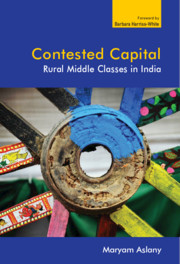Book contents
- Frontmatter
- Dedication
- Contents
- List of Figures and Maps
- List of Tables
- List of Abbreviations
- Foreword
- Acknowledgments
- Introduction: The Problem of the ‘Rural Middle Class(es)’
- 1 Trajectory of the Indian Middle Class: Its Size and Geographical Variations
- 2 In Search of the Rural Middle Classes: From Village Stratification to Rural Household Variations
- 3 Marx: Capital, Labour and the Rural Middle Classes
- 4 Weber: Marketable Capital, Status and the Rural Middle Classes
- 5 Bourdieu: Cultural Capital, Self-perception and the Middle-class Identity in Rural India
- Conclusion: Understanding the Rural Middle Classes
- Appendix A1 Non-farm Occupations in Rahatwade and Nandur
- Appendix A2 Caste and Occupations: The Urban Middle-Class Labour Market
- Appendix A3 Caste and Occupations in Rural India since 1991
- Appendix A4 Caste and Income Distribution
- Appendix A5 Caste and Socio-economic Indicators in Rural and Urban India
- Appendix A6 Caste Composition of Urban Middle Classes in India
- Appendix A7 Caste Composition of the Rural Middle Classes in Maharashtra
- Appendix A8 Household Survey Questionnaire 1
- Appendix A9 Household Socio-economic Survey Questionnaire 2
- References
- Index
5 - Bourdieu: Cultural Capital, Self-perception and the Middle-class Identity in Rural India
Published online by Cambridge University Press: 13 May 2020
- Frontmatter
- Dedication
- Contents
- List of Figures and Maps
- List of Tables
- List of Abbreviations
- Foreword
- Acknowledgments
- Introduction: The Problem of the ‘Rural Middle Class(es)’
- 1 Trajectory of the Indian Middle Class: Its Size and Geographical Variations
- 2 In Search of the Rural Middle Classes: From Village Stratification to Rural Household Variations
- 3 Marx: Capital, Labour and the Rural Middle Classes
- 4 Weber: Marketable Capital, Status and the Rural Middle Classes
- 5 Bourdieu: Cultural Capital, Self-perception and the Middle-class Identity in Rural India
- Conclusion: Understanding the Rural Middle Classes
- Appendix A1 Non-farm Occupations in Rahatwade and Nandur
- Appendix A2 Caste and Occupations: The Urban Middle-Class Labour Market
- Appendix A3 Caste and Occupations in Rural India since 1991
- Appendix A4 Caste and Income Distribution
- Appendix A5 Caste and Socio-economic Indicators in Rural and Urban India
- Appendix A6 Caste Composition of Urban Middle Classes in India
- Appendix A7 Caste Composition of the Rural Middle Classes in Maharashtra
- Appendix A8 Household Survey Questionnaire 1
- Appendix A9 Household Socio-economic Survey Questionnaire 2
- References
- Index
Summary
The question that middle-class families have to ask themselves is, what separates them from those below them? There are many differences between the middle class and the poor. For one thing, nobody likes to be associated with poor people – the poor remain quite isolated socially; their income is low and unstable; they do not possess properties; they have to do manual work; and their life style is less than modest. I believe, my household belongs to the middle class category, middle middle class. We have a fixed monthly income which allows us to cope with our daily needs and plan for our future requirements. We are able to meet our financial necessities without needing to borrow money from others or perform manual tasks; we are free from financial dependency. That is why we belong to the middle class. We are self-reliant, and therefore, surely, we belong to the middle class. That is what I feel anyway, since we are not dependent on others.
—Nitesh L. Ch., personal interview (2016)This chapter departs from the materialist-economic approach to class analysis and examines the formation of India's rural middle class from a perspective influenced by Pierre Bourdieu's approach to social classes. Bourdieu was concerned with symbolic representations, in the realms of culture, art, literature, science and language. However, it must be noted at the outset that although Bourdieu is a major theorist of class, his account of social classes is applied here differently to the way in which Marx and Weber's accounts were applied in Chapters 3 and 4. The fundamental difference arises from the fact that Bourdieu is critical of abstract conceptualisations, and his analyses of class are primarily drawn from empirical investigations and in relation to social practices. Bourdieu's approach is used in our analysis as a heuristic device, and not as a prescriptive definition of class membership. The chapter is arranged in four sections: the first examines Bourdieu's sociology and his approach to the study of social classes. The second section reviews existing scholarship on the urban middle class in India that is based on Bourdieu's approach to social classes. The third section suggests productive ways in which this sociology of class can be applied to the rural Indian context, prompted by a discussion of interior design and ‘living rooms’ in Rahatwade and Nandur.
- Type
- Chapter
- Information
- Contested CapitalRural Middle Classes in India, pp. 164 - 202Publisher: Cambridge University PressPrint publication year: 2020



